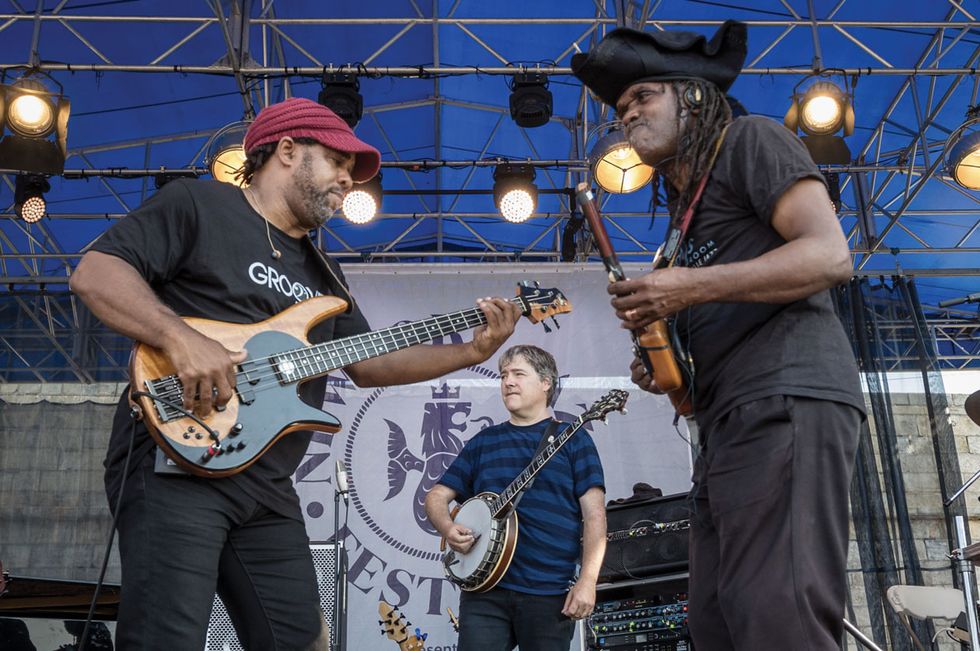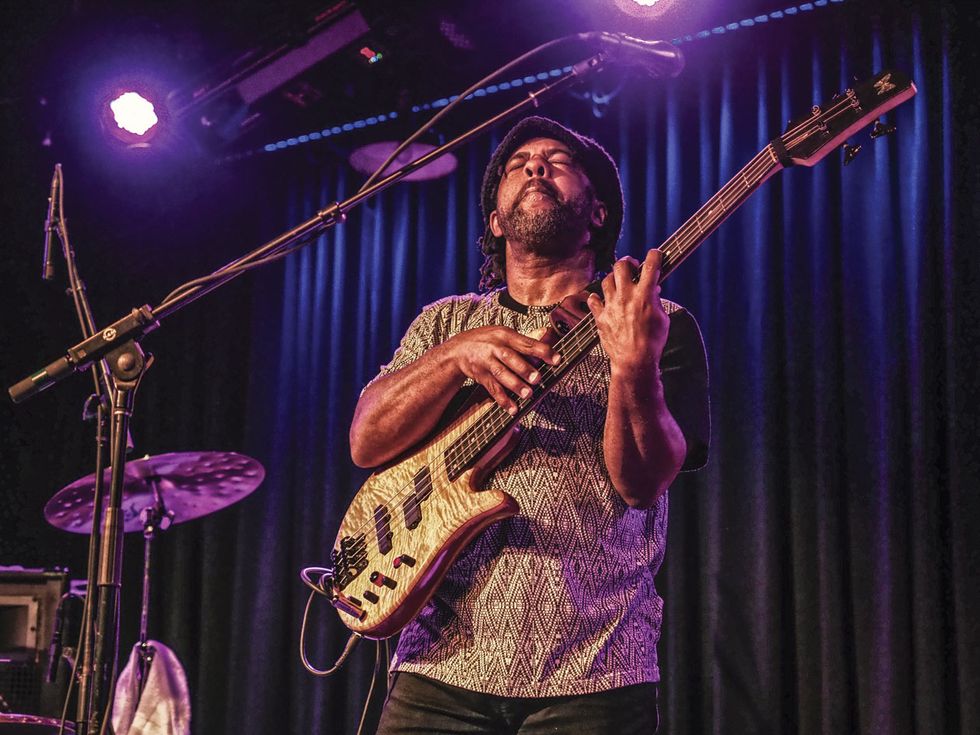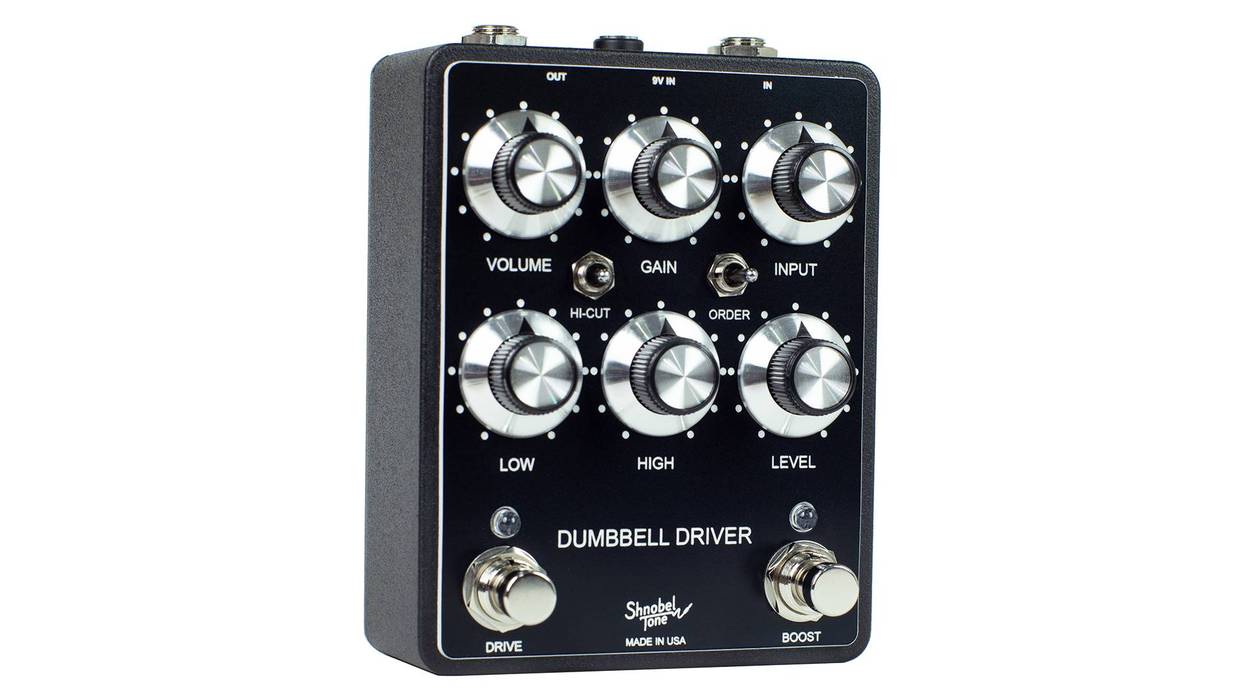Starting with his solo on the first track of Béla Fleck and the Flecktones’ self-titled debut back in 1990, Victor Wooten has been at the cutting edge of bass playing. His extensive discography as a solo artist, with the Flecktones, and with various side projects has earned him massive recognition, including five Grammys. In addition to touring the world and recording, Wooten also works hard to give back to musicians by maintaining a strong presence in bass education. He hosts workshops and clinics, runs a music camp—Victor Wooten’s Center for Music and Nature—and even wrote a novel, The Music Lesson, that chronicles the journey of a young, struggling musician looking for meaning in life.
This year, after hitting the road with saxophonist Bob Franceschini and drummer Dennis Chambers, Wooten brought them into the studio to make Trypnotyx, his 10th solo record. The energy the trio stirred up on tour translates onto Trypnotyx, as they take listeners on a wild ride through fast bebop-inspired heads, funky meter changes, and dazzling improvisational pyrotechnics that only such high-level technicians could even dare attempt.
As a producer, Wooten knows how to engage listeners and make things fun, so he had his friend Michael Winslow, the “voicetrumentalist” comedian best known as Larvelle Jones from the seven Police Academy movies, add a tastefully surreal dimension to several tracks on the album.
During our interview, Wooten spoke in deliberate and considered tones, whether discussing James Brown’s influence on modern music or ear training exercises using a cell phone. Surely this focus and clarity has been an asset to Wooten in a career that’s made his name synonymous with bass virtuosity.
As we tackled the story of Trypnotyx, Wooten offered advice for both students and teachers, and throughout our conversation, he remained humble about his abilities and described his own efforts to improve as a player. The ideas he shared with PG reveal the depth of his unwavering dedication to music, which keeps him on a lifelong quest of constant growth—a sign of a true master.
It has been five years since your last album. Why make this album now?
Though some people release records every year, I just do it when it feels right. The number one reason I wanted to release a record now is because of the trio I have with Bob [Franceschini] and Dennis [Chambers].
How long have you guys been playing as this trio? You’ve been playing with Bob and Dennis individually for a while, right?
We’ve been doing it on and off for at least a year now. Yeah, I play with them mostly with the Mike Stern band. That’s actually how I met Bob, but I’ve played with Dennis in different situations. When we decided to do this, we came up with some songs and then just went out and did some shows and solidified the music a little bit. That made it inevitable that we’d record.
How important were those shows in steering the music we hear on Trypnotyx?
Very important. When you play together, the music shapes itself and you also learn about each other. The music starts to emerge. It’s like when you sit down to talk with your friends, or, even better, strangers. When you sit down and talk, you don’t have to plan it out beforehand and say, “Hey, I’m gonna say this,” or “Say this to me when we meet.” It just happens. That’s the magic of every conversation—it’s not planned out. When you first get together with a new band, of course you have songs and concepts. But because there’s so much improvisation in this genre of music, that’s how things really start to emerge. Ideas go in their own direction and not so much in the direction you pointed out.

TIDBIT: Trypnotyx is Victor Wooten’s 10th solo record. “Though some people release records every year,” says Wooten, “I just do it when it feels right.”
At first, trying to do a record with bass, drums, and sax, or even just a tour with only those three instruments, is a little challenging—that’s not what you usually hear. We knew we could make it work because the musicians are great. But how to do it? We had to figure that out on tour.
The relationship between bass and drums is so important. What have you noticed develop over the time you and Dennis have been making music together?
Well, over the years of playing with Dennis, I’m very happy that I have worked on my timing. If you don’t have good timing, it could get very difficult to play with Dennis, because his timing is so good and it’s so free, he could lose you if he wants to. You won’t know where beat one is, unless you have really good time. But if you do, you free him up, and he knows that he can go anywhere he wants and he has you to fall back on, rather than the way we musicians always fall back on the drummer.
As far as composing for the trio, you’re writing melodies that ultimately get played by another instrument. Do you hear melody or rhythm first?
It’s either. It just depends on what goes up first. The thing about writing—or doing anything—it’s good to have more than one method. Imagine you’re driving home from work and you only know one route. If that road is blocked, you’re in a jam. So it’s great to have different songwriting tools and methods. Some of the songwriting ideas came about as I started playing with these guys. Bob uses a lot of effects and he can play chords with them. Also, using an octave pedal to bring the sax down an octave, he can become a bass. So I knew that at some point playing with Bob, I’d want him to play bass lines and let me play the melody or solo. Something totally different.
Your solo in “Liz and Opie” has some wild tones! What are you using for pitch shifting?
There’s a couple of things. On some of it, I use a DigiTech Whammy pedal, but also I’m using MIDI to have a keyboard sound play along with the bass. It sounds like I’m playing in unison with a keyboard. That’s happening on a few songs. You even hear some organ on “Thirteenth Floor,” and that’s being played on the bass.
On “Liz and Opie,” there’s a singer from India [Varijashree Venugopal] who’s actually singing along with my solo. She’s singing the exact notes that I played. That sounds like an effect, but it’s the human voice.
Victor Wooten jams onstage at the 2017 Newport Jazz Festival with his brother and fellow Flecktones bandmember, Roy “Future Man” Wooten, as bandleader Bela Fleck looks on. Future Man is playing his own invention, the Drumitar.
Photo by Doug Mason
I’m glad you mention that. I was curious about how that was recorded. So you improvised your bass solo first, and she learned it and doubled it?
Yeah, exactly. I met her on Facebook. I haven’t even met her yet in person—I just heard her singing some things on videos she posted. The first video I saw, she was singing in unison to John Coltrane’s solo on “Giant Steps” and it blew me away. I contacted her and she agreed to be on the record. She’s amazing.
You play all the different basses—fretted, fretless, upright. How do you decide what type of bass the song needs?
In most cases, the song will tell you. In some cases, you have to try stuff until it seems to fit. I just try to let the music dictate it, but there are times I might have a bass or a sound in mind and I think, “I need to find a place for this on the record.” In that case, I’ll either write something for it or just stick it in there, so it’s kind of all of the above. Number one, you let the music dictate.
What’s the story about Michael Winslow? Did you guys already know each other?
We did not, no. Earlier this year, our trio played a festival in Houston. My manager, she was contacted through Michael’s manager saying he was going to be there too and wanted to sit in with us. I immediately got excited because I’ve seen a lot of his musical things and he’s amazing, of course. He’s going by the term voicetrumentalist and he’s been doing more and more musical things, so when I heard he wanted to sit in, I thought, this is perfect, because I love anything that’s way out of the box like that. As soon as we did it, the thought of putting him on the record was immediate.
What did you perform together that first time?
We did “Funky D” as an encore. And I told him, I’ve been sampling James Brown and triggering it from a pedal. I said, that’s the vibe, but you do whatever you want with it. Then I did a solo spot and I didn’t tell him what I was going to play—mainly because I didn’t know what I was gonna play, but I also wanted to see how he was at improvising. Does he need to know what’s gonna happen first? And, man, he came out with some stuff that he told me later he’d never even done before. I did a version of “Yesterday” by the Beatles and he just laid in some harmonies, like violin parts and cello parts. It was all his voice, but he could change the octave really nicely, and he could add chords to it with a pedal—he had a whole pedalboard with distortions and reverb and all of that. It was really, really amazing.
Do you think he has a musical improvising sensibility, or is his improvisational sense more comedic?
He does both and that’s what makes him special, because a lot of high-level practicing musicians, we just play our music. When you can add some comedy to it, when you can add different elements to it other than the music, you grab people’s attention. That’s what Michael’s all about with his profession, so bringing that over to the music side, he forces you to listen because you know it’s funny, it’s serious, it’s a surprise, and he’s really, really good at it. He’s a really good improviser and you can tell he’s pulling from his upbringing—all these rock guitar solos he takes, he can make his voice sound like a harmonica, and he can pull out the blues. It’s just fascinating to watch.

Basses
Custom Fodera 4- and 5-string fretless and fretted basses
Juzek upright bass
Direct Boxes
API TranZformer
Radial Firefly
Effects
FretTraX by InnProcess Music
DigiTech Whammy Pedal
Rodenberg GAS Victor Wooten signature distortion
Eventide H9 Harmonizer
Strings
DR Strings, variety of gauges
So on “Funky D,” the James Brown references were your idea. What does James Brown mean to you?
Well, James is a big part of the core of my musical upbringing. He was so powerful for me because I got to see him in the early ’70s when I was really young, and they’re still the best live performances I’ve ever seen. I don’t know anyone who worked harder onstage and commanded the stage more than James Brown. There’s other performers, good ones—Michael Jackson, Prince, I love Beyoncé—but nobody, in my mind, can touch early James Brown.
We were just a James Brown family. Even before I was born, my parents took my older brothers to see him. Much of our upbringing really comes out of James Brown, and that’s true for a lot of people. There are even classical musicians who have pulled from James Brown, because he did it his own way, he was the energy. It was just a hot band all playing simple parts, but when you put it together, it fits like a glove and makes an amazing, funky thing. And in most cases, James is just ad-libbing, improvising on top of it and calling for changes and calling for hits and solos right on the spot. To me that’s just amazing.
James Brown liked to play in the key of D a lot, which he called “funky D”—the Dorian mode. A lot of this music comes from James Brown. That’s where Prince got a lot of it from. Bruno Mars and those guys got it from Prince and the Time, but it’s really from James Brown. And so I just wanted to capture that vibe. I wanted a fun song like that on the record, that you just groove to and you don’t have to listen to every note.
There are some social themes on the record, particularly in “Final Approach” and “Caught in the Act.”
Yeah, there’s some things that we are addressing a bit. First, I just want people to enjoy the music. But on every record I’ve done, there is a social message as part of it. Equality—that’s something. Talking about injustice, but more about peace, love, unity. That’s the main thing, and I like to do it in a subtle way and not a preachy way.
All hands on bass! Victor Wooten has expanded the vocabulary of his instrument—custom Foderas are his axe of choice—through the use of effects, extended technique, and a deep well of imagination. Photo by Steve Parke
You give workshops and clinics, you have your own music camp, and your book The Music Lesson is used as an instructional tool in some music colleges. How do you see yourself as a role model for students?
I like to help people and I want to help as many as I can. I want to help fill in the gaps and give them things that are essential—things they may not be getting from other teachers. That’s what dictates what I teach and how I teach—especially at this age where I have four kids, and I’ve done a lot of traveling. I want to help others reach those same goals.
As kids, my brothers and I never did what we did for awards, because awards come from other people. That’s something we five boys learned from our parents. As my mom would say, “The only thing you can control is whether you’re worthy of it or not. Whether you win the game, whether you win the award, you may not have control over that. Not everyone will become famous, but you can become worthy of being famous.” In other words, it’s doing things that are good examples, and that if people acted like you and did what you do, the world would be better. That’s how you want to live your life. That way you’re successful, whether people know about what you do or not.
Do you have any advice for students or teachers?
Absolutely. First, to the students: Listen to your teachers. Listening to your teachers doesn’t mean you have to believe everything they say, but, in paying attention to even the things you disagree with, you’ll learn more about yourself and you’ll learn more about whatever the topic is you’re studying.
Whatever you’re learning, make sure you’re using those tools to say what it is you want to say. Use those tools to speak your voice, not someone else’s. In music, whether it’s classical or jazz, we often get caught up just repeating what someone else said, but remember to speak your voice and say what you want to say.
For teachers, we need to remember that it is the student first. A lot of teachers want the student to look up to them, but a good teacher is looking up to the student and guiding. It’s all about the student—it’s about guiding them to rise to the top of their potential. Don’t get so caught in, “I’m the teacher, I’m dignified, and you’ve got to respect me.” All that stuff. The truth is, no, they don’t. You know, they should, but no more than we should respect them because they are the future and our job is to prepare them for it.
Do you still practice?
Yes, but it doesn’t always look like what you call practice. A text message may come in and my phone may beep or buzz—each of those sounds has a pitch. I make sure I know those pitches, so every time I hear one, it’s reinforcing that pitch in my head so I can start to say, “That sounds like a C, that sounds like a G.” I know that my windshield wipers will play a rhythm at 182 beats per minute, so every time I turn them on, I’m reinforcing my time.
A lot of musicians only think about music, as far as studying and learning, the few times during the week we have our instrument in our hands. A baby is learning to talk all the time, not just a few hours a day when it’s practice time. A baby is always listening to the point that if there are five languages spoken in the household, that child will grow up knowing five languages fluently. So I want to become fluent in music that way, and there’s music playing all the time, through sound. There are bird songs, the car reminds you to put on your seatbelt—everything is a sound, a pitch, a rhythm. When you can pay attention to that as music, there’s almost no time you’re not practicing.
Now, the type of practice where I can sit down and have my bass in my hands, that’s rare these days. I have to carve out that time. It might be one or two a.m., after everyone’s in bed, when I’ll get up and work on things I know I have to work on.
But that’s a long answer to say, the way I practice has developed and changed and broadened over the years. I don’t have the same amount of time as I did when I was younger to just sit down with my bass in my hand for hours a day. That time is gone. For me, musically, knowing that I don’t always have time to sit down with my bass, I don’t want to miss any opportunity to improve.
Victor Wooten’s trio is on fire during this performance of “Funky D” from halftime at a Knicks game at Madison Square Garden. The band’s energy is through the roof from the first downbeat. Watch Wooten’s feet as he dances between cueing James Brown samples and using his FretTraX to trigger MIDI sounds while he plays chords. Once Wooten and drummer Dennis Chambers start trading four-bar phrases at 3:30, the fireworks erupt, peaking with Wooten’s ferocious slap solo at 4:11.




















![Rig Rundown: Russian Circles’ Mike Sullivan [2025]](https://www.premierguitar.com/media-library/youtube.jpg?id=62303631&width=1245&height=700&quality=70&coordinates=0%2C0%2C0%2C0)
















![Rig Rundown: AFI [2025]](https://www.premierguitar.com/media-library/youtube.jpg?id=62064741&width=1245&height=700&quality=70&coordinates=0%2C0%2C0%2C0)











